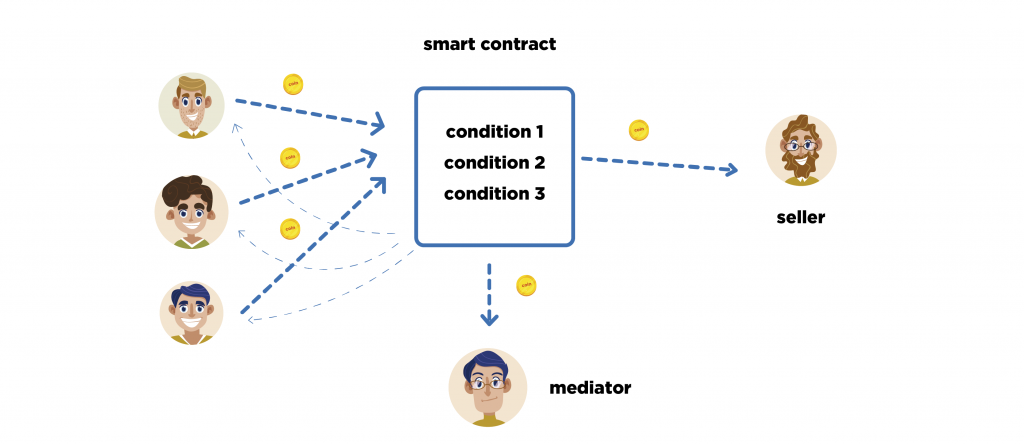
How the Consortium Blockchain Works
September 25, 2019
Corda and Real Businesses Built on Top of This Framework
August 23, 2019
Blockchain smart contracts are computer technology algorithms designed to conclude and maintain self-executing contracts performed in a blockchain environment. Such contracts are written in code form and exist in a distributed registry that is maintained and managed by a network of computers. To put it simply, blockchain allows smart contracts to perform complex rules and exchange assets while avoiding the services of a middleman.
Smart contracts on blockchain enable you to perform reliable and confidential transactions without the involvement of external intermediaries like banks, brokers or government agencies. In addition, such transactions are traceable and irreversible. These contracts contain information about the obligations of the parties in a transparent and unchangeable manner and are automatically fulfilled according to the rules set within them.
Smart contracts are largely responsible for the explosion of interest in blockchain for enterprise use. However, the first public smart contracts were not designed for use by enterprises and could not meet their requirements. In 2014 Vitalik Buterin proposed his idea for improving the Bitcoin network, a year later Ethereum was launched, which is a platform for implementing those very improvements and allowing the creation of autonomous contracts. At some point, Bitcoin also started to carry more information using Script, but it lags way behind the Turing complete smart contracts made on Ethereum. Ethereum suggested developers implement new algorithms and applications on top of the blockchain. It is the reason enterprise smart contracts are the next step in the blockchain revolution for business.
In blockchain for enterprise smart contracts the following parameters matter: how ready the blockchain technology is, what the smart contracts use cases are, and the availability of templates proven by time, scale, and performance. At “Blockchain: Rethink Trust” conference, technology and enterprise leaders pointed out the infancy of the development in this domain. For instance, Douglas Beardsley, Senior Engineer of Kadena, noted that many developers “use incredibly error-prone languages like Javascript and PHP” suggesting they don’t think critically about the tools they utilize. “While for many applications this is acceptable because it gets one 80% of the way there, the stakes are much higher in blockchain, where the code is stored in tamper-proof append-only blocks with large amounts of money on the line.”

Source: Habr.com
Smart contracts blockchain technology obviously implies the use of blockchain, where all logic is placed in the software container of the digital ledger — the block. The block combines all the transactions related to a particular smart contract making it certain that the money will be transmitted if the criteria are met. Unlike currency, smart-contract transactions act as inputs and outputs and lead to actions outside the blockchain, in the real or digital world. Below we discuss what’s needed to make it work.
Smart contract attributes:
The financial sector is the most solvent source of demand for smart contracts, if not the most promising. Interestingly, about half of all crimes in banking are committed by current or former employees. Therefore, banks constantly review possible solutions to eliminate the human factor, including blockchain technology. The introduction of smart contracts can simplify these processes, so the largest players have started development in this area.
As a proof of the promise for blockchain smart contracts use cases, the R3 consortium involves 45 large financial organizations, along with the leading global banks, and develops a platform called Corda optimized for the financial sector. More than 15 member banks have developed prototype smart contracts for their operations, giving participants the opportunity to see transaction data in real time. For instance, Barclays uses smart contracts to automate payments and change ownership of a transaction. HSBC and Bank of America have replaced letters of credit with smart contracts.
Smart contracts could revolutionize the way we do business. They have the potential to introduce radical change by speeding up transactions, reducing paperwork, and increasing overall aggregate efficiency. Many industries like music, art, finance, retail, real estate, telecom and supply chains could benefit significantly from using smart contracts. However, the full working capacity of smart contracts is not unlocked completely due to the limitations of infrastructure: it is simply not developed yet.
Besides, there is a lack of specialized projects for most of these industries. Clearly, from a technical point of view, the evolution of smart contracts has just begun, and in the nearest future they are going to evoke a lot of changes that companies, big and small, will be able to leverage. Although not all variables in these changes are known, this kind of automation is progressive and will inevitably transform our everyday business practices.


